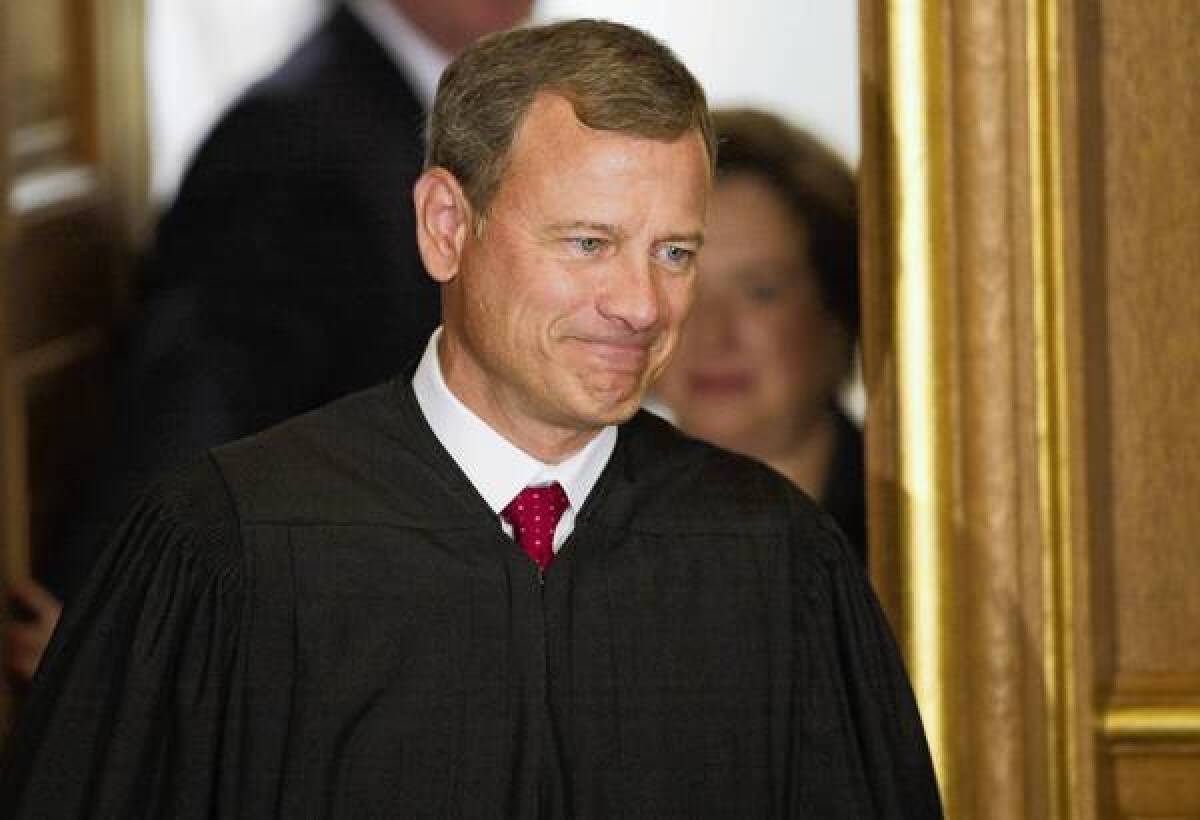Chief Justice Roberts signals that Supreme Court remains independent

WASHINGTON — Chief JusticeJohn G. Roberts Jr.considers it an insult when he hears it said that he and the justices are playing politics. He has always insisted his sole duty was to decide the law, not to pick the political winners.
Until this week, however, not many were inclined to believe him. Those on the left — and the right — were convinced they could expect Roberts to be a reliable vote on the conservative side.
But no more. The chief justice took control of two of the biggest politically charged cases in a decade, involving the Affordable Care Act and Arizona’s immigration law, and he fashioned careful, lawyerly rulings that resulted in victories for the Obama administration.
Those who were surprised might have taken note of the man Roberts describes as one of his heroes — Chief Justice Charles Evan Hughes, a progressive Republican who was chief justice in the 1930s when PresidentFranklin D. Roosevelt and the court clashed over the New Deal.
When the high court and the Roosevelt administration seemed headed for a constitutional showdown, Hughes persuaded one wavering justice to switch sides and vote to uphold a minimum-wage law and a collective bargaining measure. The “switch in time that saved the nine” defused FDR’s plan to load up the Supreme Court with additional justices appointed by him. The court-packing plan died in the Senate. The deft leadership by Hughes preserved the court as an independent institution.
This year’s court battle over the healthcare law did not rise to the level of the New Deal-era clash. But had the Roberts court struck down Obama’s healthcare law, Democrats and progressives would be making those historic comparisons this week.
“It was masterful. Roberts believes in a modest role for the court, and he was doing just what he promised he would do,” said Stanford law professor Michael W. McConnell, a former appeals court judge appointed by PresidentGeorge W. Bush. “Had the court struck down the law, they would have been the focal point of the campaign. Now, the court comes out with its reputation enhanced.”
Acting on his own, Roberts saved the Affordable Care Act from being struck down as unconstitutional before it could go into effect. His four fellow conservatives had voted in favor of Republican state officials to void the Democrats’ healthcare measures that were decades in the making.
Roberts, however, found a narrow way to uphold the law as an exercise of Congress’ taxing power. “Because the Constitution permits such a tax, it is not our role to forbid it, or to pass upon its wisdom or fairness,” he wrote in an opinion joined in part by the four liberal justices.
And in the immigration dispute between Arizona and the Obama administration, Roberts led a 5-3 majority Monday that said federal officials, not the states, had “broad discretion” in deciding whether to arrest and deport illegal immigrants. The ruling blocked Republican-led states from moving to aggressively enforce immigration laws on their own.
The message from Roberts was that the high court, even in a heated election year, was an independent institution and an enforcer of the Constitution — not a friendly forum for just one party or one side of the ideological divide.
But no one should expect that Roberts has moved left. Next term, the court will take on college affirmative action and possibly gay marriage, and Roberts is likely to take a conservative stand.
Still, this week’s rulings surprised much of Washington, where the partisan divide is so deep that few anticipated a nonpartisan decision. Republican leaders had been preparing to celebrate the demise of Obama’s healthcare law. Because the court had five Republican appointees, their assumption was the law would go down on a 5-4 vote.
Counting the same votes, Democrats and liberal groups were prepared to launch a political campaign against what they would describe as the pro-business, right-wing Roberts court.
The healthcare ruling would be paired with Citizens United, the 2010 decision that led to a gusher of new political spending.
In that case Roberts, with some hesitation, joined a 5-4 opinion written by Justice Anthony M. Kennedythat extended free-speech rights to corporate groups and unions. At first, Roberts tried to fashion a narrow ruling that would have allowed Citizens United, a small nonprofit group, to sell a DVD that derided Hillary Rodham Clinton, then a Democratic candidate for president. But Kennedy insisted on a much broader opinion that struck down the long-standing ban on campaign spending. Roberts then joined to make the majority.
This time, by contrast, the chief justice kept control of the healthcare opinion. With four conservatives on his right and four liberals on his left, he chose the narrow, middle-ground ruling. He agreed with the conservatives it was unconstitutional to “compel” Americans to buy products, but he also agreed with the liberals that the insurance mandate could be upheld as a tax.
Kennedy, ousted from his spot at the center of the action, delivered an angry, stinging dissent Thursday that accused the chief justice of “vast overreaching” and having “invented” a way to uphold the law.
Constitutional experts said that when considering what was at stake, the chief justice deserves enormous credit.
Harvard Law School professor Richard Lazarus, who has known Roberts since their student days, said Thursday’s opinion shows he “does what he thinks is the right interpretation of the law, not what he thinks is necessarily popular or to curry favor.”
Conservatives said they were disenchanted. “Make no mistake: Chief Justice Roberts’ opinion is a sellout of constitutional principle of the highest magnitude,” said Chapman University law professor John Eastman.
For his part, the chief justice said he was glad to leave Washington for a summer teaching trip to Malta. It’s “an impregnable island fortress,” he told a group of judges Friday, tongue in cheek. “It seemed like a good idea.”
More to Read
Start your day right
Sign up for Essential California for news, features and recommendations from the L.A. Times and beyond in your inbox six days a week.
You may occasionally receive promotional content from the Los Angeles Times.







